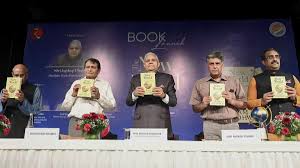Global scenario concerning for peace-loving nations: Dhankhar

New Delhi, June 24 – Expressing growing concern over the turbulent international landscape, Vice President Jagdeep Dhankhar has urged the global community—especially nations committed to peace and democracy—to remain vigilant in the face of rising global instability. His remarks, delivered at a public forum, reflected India’s increasing apprehension over growing conflicts, political polarization, and disregard for democratic values in several parts of the world.
Dhankhar highlighted how the shifting geopolitical climate, marked by armed conflicts, ideological extremism, and threats to multilateral cooperation, is placing enormous pressure on nations that have long championed peace, stability, and rule-based international order.
“The current global scenario is deeply concerning. For nations that believe in peace and harmony, these are unsettling times. We must stand firm in our commitment to democratic values and collective security,” Dhankhar said.
Rising Global Instability Alarming for Democracies
Although he refrained from naming any country, Dhankhar’s message clearly pointed to escalating military confrontations, authoritarian posturing, and systemic erosion of civil liberties in many regions. The Vice President’s concerns are aligned with what many global observers have described as a period of democratic backsliding and growing threats to global peace.
From prolonged wars in Ukraine and Gaza, to tensions across the Taiwan Strait, and the widespread use of disinformation to disrupt electoral processes, Dhankhar argued that peace-loving societies must not remain silent witnesses to these alarming trends.
“We are witnessing an era where aggression is normalized, and democratic voices are being muffled. This trend endangers not just individual nations but the very foundation of global stability,” he stated.
India’s Enduring Commitment to Global Peace
Highlighting India’s deep-rooted values of non-violence, tolerance, and dialogue, Dhankhar underlined the country’s continued efforts in promoting peace on the world stage. He noted that India, since its independence, has stood firm in its principles and has consistently pushed for diplomatic solutions to conflicts.
India’s contributions to UN peacekeeping missions, its balanced foreign policy, and leadership in forums like the G20, BRICS, and the Non-Aligned Movement reflect its enduring belief in a peaceful and cooperative world order, Dhankhar added.
“India’s moral compass is grounded in the idea of Vasudhaiva Kutumbakam – the world is one family. This belief continues to guide our approach to international relations,” he said.
The Importance of Unity Among Democratic Nations
Calling for unity among like-minded nations, Dhankhar emphasized that peace-loving countries must form strategic partnerships based on shared values such as freedom, justice, and equality. He encouraged cooperation in areas like climate change, cybersecurity, public health, and economic equity, while cautioning against isolationist policies that undermine global progress.
“We need collective resolve and shared leadership. The current moment demands a strong moral and diplomatic alliance among peace-promoting nations,” he said.
Polarization, Propaganda, and the Digital Threat
Dhankhar also warned of digital threats that amplify division and destabilize societies. From cyberattacks on national infrastructure to the manipulation of public opinion through social media algorithms, he emphasized that the digital space is now a critical frontier in the battle for peace and democracy.
“Disinformation is the new weapon of mass disruption. It erodes trust in institutions, sows hatred, and undermines public unity. We must build safeguards and foster digital literacy,” he cautioned.
The Road Ahead: Diplomacy, Responsibility, and Resilience
Dhankhar’s message served as a reminder that peace is not an automatic outcome—it must be built through diplomacy, restraint, and international cooperation. He urged governments, civil society, youth leaders, and media to play a constructive role in countering polarization and building an inclusive global narrative.
“Peace is not passive; it’s a deliberate, sustained process. We must invest in education, intercultural understanding, and mechanisms that resolve disputes without violence,” he said.
His remarks also hinted at the need to reform international institutions so they remain effective in addressing 21st-century challenges. Dhankhar noted that peace cannot thrive when global institutions fail to represent the voices of the Global South or address injustices faced by smaller or developing nations.
A Broader Warning and a Hopeful Note
While the Vice President’s message was serious, it was not without hope. He stressed that history has shown how peace movements, ethical leadership, and global solidarity can overcome even the darkest chapters.
“Humanity has always found a way forward. If we can come together and reaffirm our shared values, peace will prevail,” Dhankhar concluded, earning strong applause from the audience.






